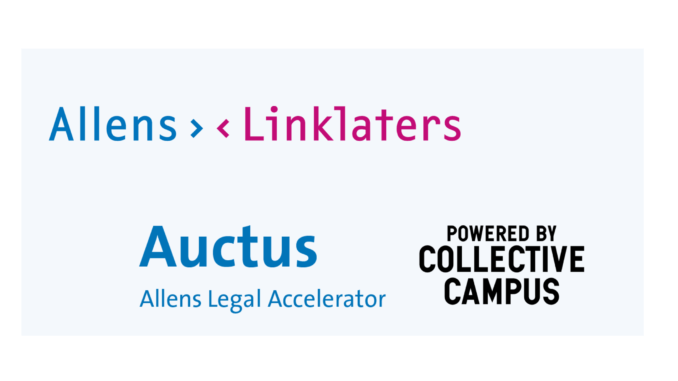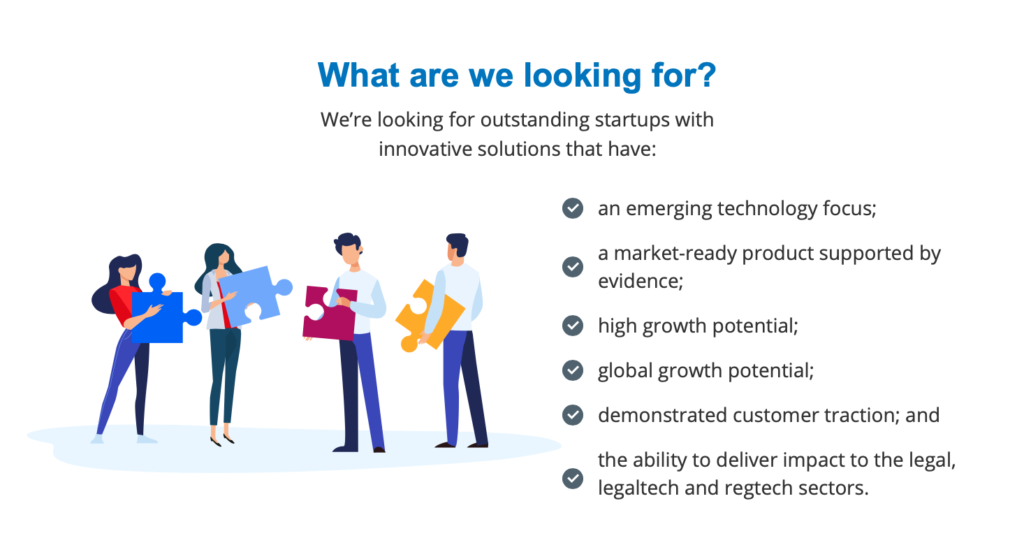
Linklaters’ Australian ally, Allens, has launched a legal tech accelerator that is primarily focused on finding solutions to two problem areas: improving the contracting process; and risk assessment and compliance.
The new accelerator, which joins a growing number of legal tech engagement programmes at firms across the world, is called Auctus, and will help startups through a combination of expert advice and ‘facilitated access’ to the firm’s network. The project will also be supported by startup accelerator Collective Campus.
The accelerator will be delivered remotely where possible and go for a total of eight weeks. And they are looking for applicants right now, (see below).
Unlike some incubators, Allens has come out with two clear areas that they want to focus on, although they have said they will also welcome startups with other focus areas. And it’s interesting to see how they have described the two key areas they are looking at:
Challenge one: Contract creation and management
‘Legal contracts are static, highly manual to create and manage, and difficult to analyse at scale. This creates difficulties for law firms and clients alike in both managing existing contracts effectively and making sure their legal agreements are the best they can be, for all parties and stakeholders.
We’re interested in solutions that can help us enhance contract management, reduce manual work and decrease time spent creating contracts.
Such solutions may include, but not be limited to, data analytics, machine learning and artificial intelligence (AI), data management, blockchain, natural language processing (NLP), application programming interfaces (API), algorithm-driven automation and reporting applications.’
Challenge two: Risk assessment, management and compliance
‘There is increasing demand among businesses for detailed advice on risk exposure and compliance response. However, there are significant technical and operational barriers to identifying, assessing and prioritising risks, and setting and simplifying compliance controls, as part of a risk management framework. Similarly, businesses find it difficult to both operationalise and culturally embed these practices and mindsets.
We’re interested in solutions that can help us support our clients in understanding their risk and compliance issues and embedding processes for ongoing management.
Such solutions may include, but are not limited to, data analytics, machine learning and artificial intelligence, data management, natural language processing (NLP), reporting and enterprise risk management (ERM) applications.’
Anna Collyer, Partner and Head of Innovation at Allens, added: ‘We’re really excited by the prospect of building on our legal tech work by joining forces with startups in the legal tech space. We see enormous potential for the development of new legal tech products to add value to our business and the legal services industry.’

–
So, there you go. Now, you may ask: do we need more incubators, accelerators, and scale-up programmes? The answer is: yes, we do.
Why? Because they are, to put it simply, a win-win for all involved. They help foster a deeper engagement with legal tech applications that can actually move the dial inside law firms, and they allow legal tech companies to really learn what it is the lawyers actually want them to do and the real world challenges they need to solve.
New legal tech on one side of the street and lawyers on the other side, with a big gap in between the two, just slows things down. The more the two camps can build closer relationships, learn from each other, share know-how and ideas, the better the industry will be as a whole.
One additional point Artificial Lawyer would make is that in Allens’ application notes they stress that there is no obligation for the firm to use the software of the tech companies that join after those eight weeks are over – which is fair enough if we’re going to be legalistic about things – but, it’s sending the wrong message. The hope is that Allens does use the tech of the companies that join its programme on a lasting basis. Not all, for sure, but some.
They say: ‘Any ongoing engagement at the end of the eight-week programme is entirely at Allens’ discretion. Think of your time in the programme as an opportunity to further develop your product, build relationships and demonstrate what you can do, while benefiting from the education and perks.’
But, just running the accelerator for eight weeks and then saying bye-bye to all involved is missing an opportunity. Maybe it’s better to say that Allens really hopes to use the tech long-term and build lasting mutually beneficial relationships with several of the companies that join (albeit that they can’t guarantee that)?
Any road, it’s probably the legal thing getting in the way of good intentions. Looks like a great project with clear goals in mind.
If you’d like to apply, check out the details here.